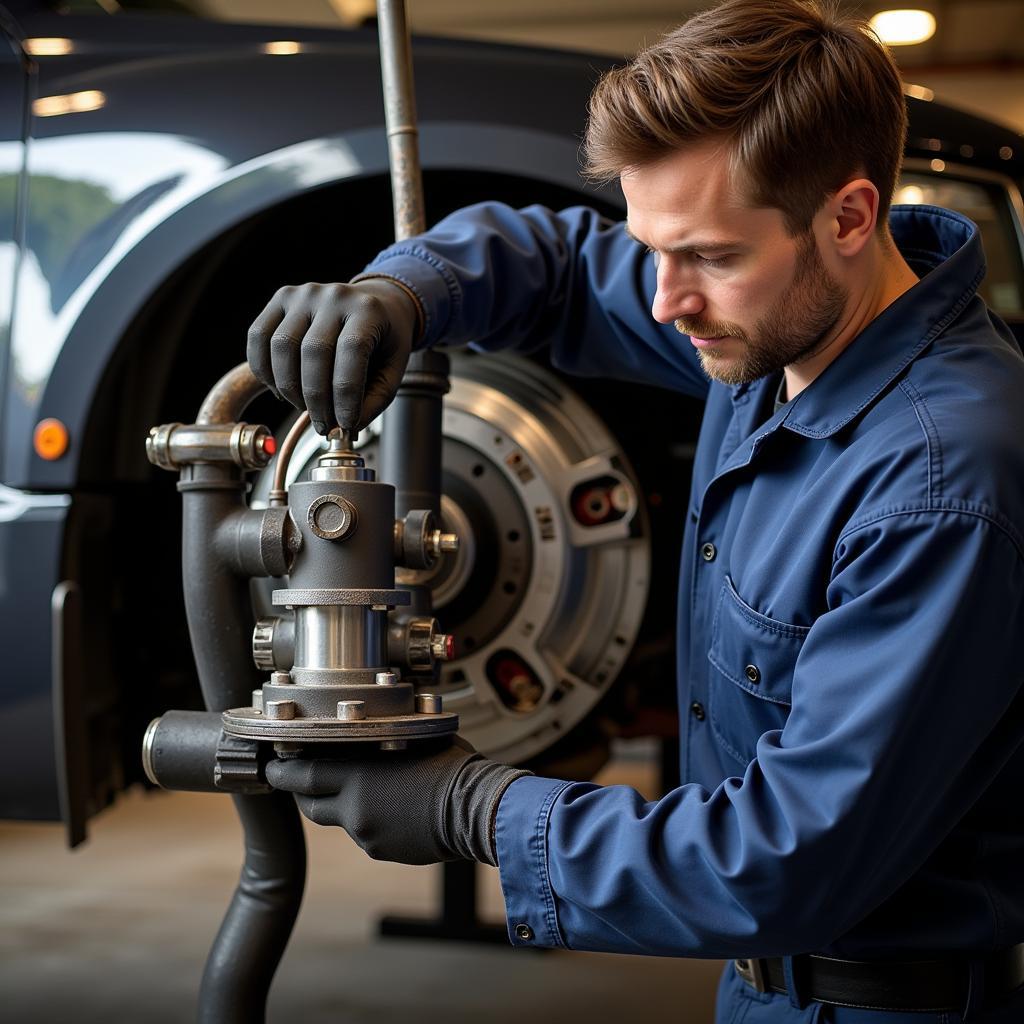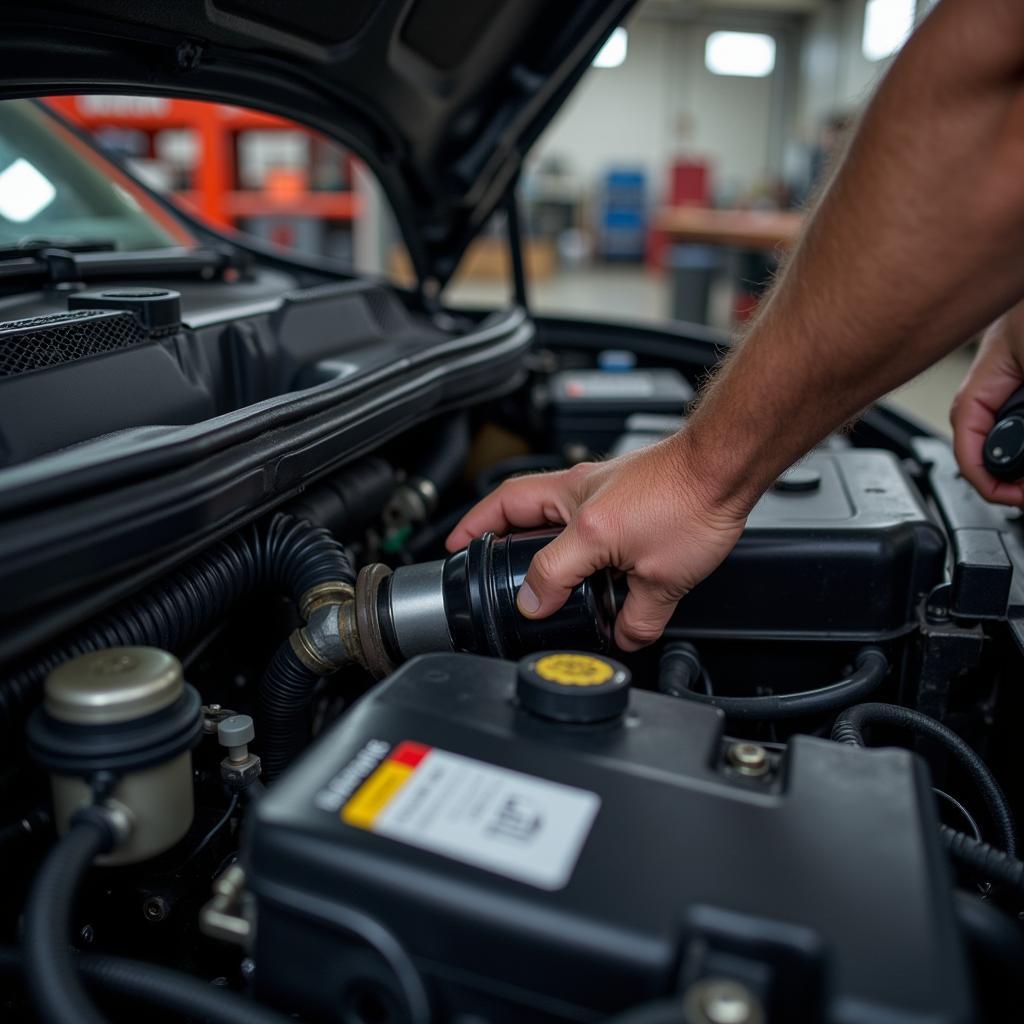Understanding the intricacies of your diesel car’s fuel system can be daunting, especially when it comes to diagnosing potential issues. This comprehensive guide delves into the world of “Diesel Car Pump Diagnostics,” equipping you with the knowledge to identify, understand, and address potential fuel pump problems.
The Heart of Your Diesel Engine: Understanding the Fuel Pump’s Role
The fuel pump, often referred to as the heart of a diesel engine, plays a critical role in delivering fuel from the tank to the engine. Unlike gasoline engines that rely on spark plugs for ignition, diesel engines utilize highly pressurized fuel, injected at precise timings, to initiate combustion. This is where the fuel pump shines. It draws fuel from the tank, pressurizes it to extremely high levels (often thousands of PSI), and delivers it to the fuel injectors, which then spray it into the combustion chambers.
Common Symptoms of Diesel Fuel Pump Problems
A malfunctioning fuel pump can manifest itself in various ways, often mimicking other engine-related issues. Being able to recognize these symptoms can save you time, money, and potential headaches down the road. Here are some telltale signs that your diesel car pump might need attention:
- Difficulty Starting: If your diesel engine cranks for an extended period before starting or requires multiple attempts, a failing fuel pump could be the culprit. This suggests the pump is struggling to deliver sufficient fuel for ignition.
- Engine Stalling: Experiencing engine stalls, especially under load or acceleration, points towards inconsistent fuel delivery, a common symptom of a malfunctioning pump.
- Rough Idling: A rough or uneven idle, often accompanied by vibrations, can indicate low fuel pressure caused by a weak or failing pump.
- Reduced Power and Acceleration: If your diesel engine feels sluggish, lacks its usual power, or struggles to accelerate, it might be starved of fuel due to a faulty pump.
- Increased Engine Noise: Unusual whining noises coming from the fuel tank or engine bay, especially during pump operation, can be a sign of a failing pump.
Diagnosing Diesel Fuel Pump Issues: From Basic Checks to Advanced Diagnostics
Identifying the root cause of fuel pump problems requires a systematic approach, ranging from simple visual inspections to advanced diagnostic tools.
Visual Inspections and Basic Checks
- Check Fuel Filter: A clogged fuel filter can restrict fuel flow and mimic fuel pump symptoms. Inspect and replace the filter if necessary.
- Inspect Fuel Lines: Examine fuel lines for cracks, leaks, kinks, or blockages that can impede fuel delivery.
- Listen for the Fuel Pump: Turn the ignition key to the “on” position without starting the engine. You should hear a brief humming sound indicating the fuel pump is priming the system. Absence of this sound might suggest a pump failure.
 Diesel Fuel Pump Inspection
Diesel Fuel Pump Inspection
Advanced Diagnostic Techniques
- Fuel Pressure Testing: Employing a fuel pressure gauge allows you to measure the pressure within the fuel system. Comparing readings to manufacturer specifications can pinpoint pump weaknesses or failures.
- Diagnostic Scan Tools: Modern diesel vehicles come equipped with onboard diagnostic systems. Utilizing a compatible scan tool can reveal stored fault codes related to the fuel pump or other fuel system components.
- Electrical Testing: Using a multimeter, you can test the fuel pump’s electrical circuits, including the pump relay, fuse, and wiring harness, to ensure proper power supply.
When to Seek Professional Help
While some diesel car pump diagnostics can be performed by DIY enthusiasts, seeking professional assistance is recommended for complex issues or when dealing with high-pressure fuel systems. A qualified mechanic possesses the expertise, tools, and safety procedures to accurately diagnose and repair fuel pump problems, ensuring your safety and the longevity of your vehicle.
Preventive Measures: Extending the Life of Your Diesel Fuel Pump
Taking proactive measures can significantly extend the life of your diesel fuel pump and prevent premature failures.
- Regular Fuel Filter Replacements: Adhering to manufacturer-recommended fuel filter replacement intervals ensures clean fuel flow and minimizes strain on the pump.
- Maintain a Full Tank: Driving with a low fuel level can cause the pump to work harder, potentially overheating and leading to premature wear. Aim to keep your tank at least half full.
- Use High-Quality Fuel: Opting for high-quality diesel fuel minimizes contaminants that can clog the fuel system and damage the pump.
 Diesel Fuel Pump Maintenance
Diesel Fuel Pump Maintenance
Conclusion
Mastering diesel car pump diagnostics empowers you with the knowledge to keep your diesel engine running smoothly. By understanding the fuel pump’s vital role, recognizing potential warning signs, and adopting preventive measures, you can ensure optimal performance and longevity for your diesel vehicle.
FAQs
1. How often should I replace my diesel fuel filter?
It’s generally recommended to replace your diesel fuel filter every 15,000-30,000 miles, or as specified in your vehicle’s owner’s manual.
2. Can I drive with a failing diesel fuel pump?
It’s highly discouraged to drive with a suspected failing fuel pump. Doing so can lead to further damage and potentially leave you stranded. Seek professional help immediately.
3. How much does it cost to replace a diesel fuel pump?
The cost of replacing a diesel fuel pump can vary significantly depending on your vehicle’s make and model, labor costs, and the type of pump required.
4. Can bad fuel cause diesel fuel pump problems?
Yes, contaminated or low-quality fuel can clog fuel filters, damage injectors, and potentially lead to fuel pump failure.
5. How can I prevent air from entering my diesel fuel system?
Ensuring proper fuel filter installation, avoiding running the tank completely empty, and inspecting fuel lines for leaks are key to preventing air intrusion.
Need Help? We’re Here for You!
If you’re experiencing issues with your car’s diagnostic system or have any questions, don’t hesitate to reach out. Our team of experts at DiagFixPro is available 24/7 to assist you. You can contact us via WhatsApp at +1(641)206-8880 or email us at [email protected].
Looking for information on fixed car diagnostic? Or perhaps you’re interested in learning about free diagnostic car tests? We’ve got you covered! Check out our comprehensive resources on these topics and more on DiagFixPro.com.

Leave a Reply